

BLACK BUCKETS IN THE SKY-THE WILDE FLOWERS AND CARAVAN
AN INTERVIEW WITH RICHARD SINCLAIR
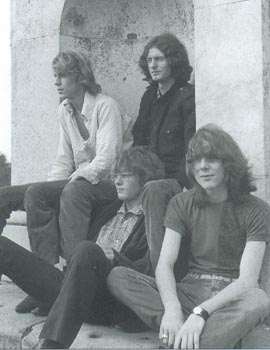
Canterbury. It’s a magical place. It’s the home of English Christianity and the ancient majesty of the Cathedral appropriately looms over the City. Everywhere that you turn there are reminders of legendary names: Beckett, Chaucer, Marlowe, Bagpuss. The air positively reeks of History. Back in the 60s the air reeked of something a little more exotic, and a new breed of legends emerged in this venerable City.
In the wake of Merseybeat, most British cities and towns had their own network of musicians who forged the local ‘sound’ and Canterbury was no exception, however unlike those other Provincial groups who now earn a living playing their hits in Sixties revival shows at Butlins, the "Canterbury Scene" grew to be something more than the fading memory of a few aging groups, endlessly regurgitating the past. Maybe it’s because they never actually had any ‘hits’ as such, but many of the original core Canterbury players are still around today, making music that’s just as experimental, challenging and satisfying as their 60s and 70s work. In fact, ‘Canterbury’ is now a ‘Sound’ rather than a ‘Scene’, because as the Canterbury cult has spread worldwide over the decades, some of the best ‘Canterbury’ music has been produced by non-Canterbury, indeed non-British musicians.
Now, a lot of you may visualize the Canterbury Scene as being a bunch of balding, bearded Beatniks with no dress sense, lost in their own isolated spaces, doodling away for hours on tuneless jazz dirges that bear such titles as "Opossum Impersonates Napoleon Scandal Part 8", or "Buttocks-First Movement". Well, yes it IS true that some Canterbury bands have been known to play music that changes time signature more often than a hyperactive millipede changes feet, but if you dig in further you find gorgeous melodies, dry lyrical wit, staggering instrumental technique played at a volume that would make Heavy Metal fans wet themselves ("Like Vinderloo coming through your ears" according to Hugh Hopper) and, perhaps unexpectedly, some of British Rock’s most individual vocalists.
Both of Canterbury’s most celebrated groups, The Soft Machine and Caravan, boasted a double-vocal facility within their ‘Classic’ early line-ups. The Softs had the urgent strainings of Robert Wyatt coupled with the ultimate lounge lizardry of Kevin Ayers, while Caravan featured the lighter than air naughtiness of Pye Hastings and the gently romantic eccentricities of former choirboy Richard Sinclair. The latter is possibly the most popular Canterbury scene figure of them all. A consummate Bass guitarist and an under-rated exponent of the 6-string instrument too, Richard was an original member of The Wilde Flowers, a loose, almost mythical aggregation that came to be viewed as the Mother of all Canterbury bands owing to the subsequent notoriety of many of its members. Richard later became a founding member of Caravan, and following his departure from that band in 1972 he has played in Hatfield & The North (probably the quintessential Canterbury band), Camel, In Cahoots and Skaboosh along with his own bands Caravan Of Dreams and RSVP. Richard is currently releasing a series of archive recordings on his own Sinclair Songs label. He’s also gigging all over the world-Japan, Norway and Seattle most recently-and working up new material. Your humble correspondent was privileged to spend a day with Richard at his home in the mythical St Dunstans area of Canterbury, chatting about ye olden times with Caravan. This is the Bassman’s Tale…
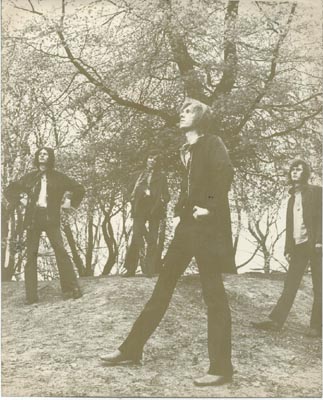
Can we go
right back to the beginning? How did you get into music in the
first place?
Right back to the beginning of time? I was born in Canterbury, on
the 6th of June 1948 and my parents were very musically
orientated. My father was a musician in Canterbury, an
entertainer. He was a singer, bass player, double bass player and
drummer. He used to play lots of the popular music of that time
and all of that wartime stuff. My Grandad was also an
entertainer. He did all of the old-time Pearly Kings stuff, and
he used to have a Pub in Canterbury called the "King’s
Head". I think the Sinclair family has been entertaining
around here since about 1900. The family were also photographers.
At the turn of the century they had a photography shop in
Northgate, here in Canterbury, and they turned out some of the
biggest prints done at the time. Actually I’m lucky to be on
the planet at all. My Grandad was invited to go on the Scott
expedition to the South Pole in about 1910, but Granny Sinclair,
who sang in the old Sunday Music Halls, thankfully decided that
he wasn’t going to go, because subsequently all of that team
perished didn’t they.
Anyway, my musical career started when I used to do bits and
pieces at school. I was three when I was first given one of these
(strums a ukulele), my first instrument, and the funny thing is,
I’ve just been given one now at the age of 55! So I’ll
be going back through all of the tunes like "She’ll Be
Coming Round The Mountain When She Comes". Actually, maybe
that’s where I got the "land of grey and pink"
from, "She’ll be wearing pink pyjamas"! So I
started then really, but the professional things started when I
was at the Archbishop’s School in Canterbury. My musical
developments were very much to do with the sort of melodic forms
that Christians listen too, I suppose, even though we
weren’t totally Christians at school of course. I still
believe in a kind of spiritual faith of some sort, though
I’m not sure exactly what it is yet, I’m still checking
it out. But the musical form in Canterbury is pretty choral, with
the Cathedral and the Churches and the Christian tradition here.
As kids we used to go into Assembly and sing all of these tunes
that were written anywhere from two or three hundred years ago to
right up to date that had a quite religious bending, that sort of
tonality, and I think that lots of the Canterbury Scene boys were
maybe a bit influenced by that. Also I was certainly influenced
by my father’s singing. I used to go and watch him when I
was about 4 or 5 years old when he was doing concerts around
Canterbury. I was subjected to someone entertaining people and I
could see it was fun and I used to really enjoy it. I hadn’t
got it in mind to do it myself then, but obviously if you’re
born into a family where someone goes out and entertains and
sings and banjo’s and guitar’s and double bass’s
and drum’s then it’s a good start isn’t it? I met
a few mates at school who were interested in music too, and by
then my dad had given me a guitar so I was trying to ping out my
own tunes. I’d heard so many tunes by then that it was quite
nice to do it, and I think that was also passed down from my
father because he was able to play a 4-string banjo behind
whatever melody you can think of. If he could sing the melody
then he could play all of these chords automatically. My
sister’s boyfriend was also a guitarist and he showed me
some chords when I was seven, so by the time I left college at 19
I’d gone through all of these early starts, the first one of
which was getting involved with The Wilde Flowers.
What kind
of impact did the Rock ‘n’ Roll "Explosion"
of the 50s have on you?
It was The Beatles for me. The earlier Rock & Roll thing
didn’t affect me much at all. I was more into the
‘pop’ music of the 50s because my father used to listen
to it. He would tape it on a very early tape recorder, and then
he’d listen to it and learn it and then get sheet music and
sort the different tunes out. He wasn’t into writing his own
tunes. He played the popular standards of the time either in big
bands or small bands. We used to listen to the radio a lot when I
was a kid at home, lots of musical programmes, but I would have
been quite young for the Rock & Roll thing in the 50s. My
sister, who was 9 years older than me, was listening to stuff
like Mario Lanza! So we were listening to melodic stuff and the
rock thing came along and I don’t think my father was
particularly impressed with it. He liked some of the songs but he
didn’t like the actual singing, or shouting. So no, I
didn’t really get off on Elvis or Cliff Richard or any of
them. We used to say what ‘orrible voices they’ve got,
though in fact they were really good entertainers in a certain
type of way. They were talented, but if you’d been used to
listening to people like Nat King Cole or Frank Sinatra or George
Formby or who was the chap who used to sing "Cumberland
Gap"? Lonnie Donegan! We used to learn his tunes! As a 14
year old, the first tune I learned on guitar went something like
(sings in ‘skiffle’ voice) "It takes a worried man
to sing a worried song. It takes a worried man to sing a worried
song…and I’m worried now, but I won’t be worried
long", so that’s the first one I learned on guitar. And
then it got worse than that! But we started to really work hard
at it and I think the next was "There were bells on a hill
but we never heard them ringing" you know, Beatles and all
that.
"Till
There Was You"
Yeah, so I learned all of those sort of tunes and did them at
school. The first band I was in played in a village hall at a
little place outside Canterbury called Bridge. The band was
called "The Pulsators" and there was my mate Roger
Tovey and Richard Someone-Else and Kenneth Wharfe. Actually Ken,
I’ve just seen recently, was Princess Diana’s
Bodyguard! Nice to see that he made it, and he was in that first
band as a singer! Canterbury’s full of all these
inter-links, like when I was at school all of those other lads
were at school too, like the Hopper boys were at the Grammar
School and my cousin Dave was in the Grammar School too. So was
Mike Ratledge. I went to a Secondary Modern school, the
Archbishop’s, so my thing was slightly different.
How did
you meet the Hopper brothers (Brian and Hugh)?
Well what happened is that my dad used to go around and play
local concerts. The Hopper boy’s parents used to go out and
see my dad playing. They liked his music so they would go and see
him sing. That’s one of the things you did in those days,
dinner and dance stuff. So anyway there came a call one day from
Hugh, who said that they had heard that I played guitar. They
organised a meeting where I would go up and play in Tanglewood,
their home in Giles Lane. So I went up there, aged 14 or 15, and
played with the bigger boys. They were making a din on Chuck
Berry and God knows else, and they were trying to write their own
tunes. Before then I think I’d been playing a bit with my
cousin Dave, though I hadn’t really met him at all until we
were about 14 or 15, or recognised him as a similar sort of
spark. I got on quite well with the Hoppers. My dad let me use
his PA to play my guitar through, a kind of 1950s crocodile skin
amp. Up we went, made a din, and it worked quite well.
They’d been trying to organise a band for quite some time,
and then people like Robert Wyatt appeared with a drum, a snare
drum, and came and played, and slowly a band started to form.
The Hopper
brothers were coming to Rock from a jazz direction?
They had listened to a lot of things. I’d listened to some
jazz stuff but a more popular jazz kind of thing than they were
into; because of Robert’s influence and being at Grammar
school they had been collecting all of these early jazz records.
I was interested by it. I was very interested when I got a tape
from Hugh Hopper of tunes that he had written because on the back
of the tape there was the whole of Eric Dolphy’s "Out
To Lunch", which I remember listening to for two years after
that, thinking "Christ! I’m into this stuff".
I’d been into stuff like The Beatles which is harmonically
interesting and has nice singing, and then suddenly I’m
introduced to these people that played their instruments as if
they were animals and God knows what else. The whole music form
changed from just three or four chords and the melody-- this
thing was expressive! That’s when I first came across it,
through Hugh, but that’s when you do start to come across
these things, when you start to play music.
In those early days everything was directed by Brian and Hugh. We
had to play things like… they weren’t so interested in
Beatles stuff, they wanted to "Rock Out!" Chuck Berry
they were really into and all of the rhythm orientated Blues. I
didn’t know much about Robert or Mike Ratledge’s
background at the time as they were both slightly older than me.
I was never totally influenced by him but I was always knocked
out by Robert’s imagination. I was impressed that he could
actually create these areas where he didn’t sound like he
was singing as if he was someone who came out of the 1800s or
whatever. He wasn’t trying to emulate things but was always
looking for new angles and cross-references. Brian Hopper was
like that too because he did infuse influences like Indian music
or whatever into our music. It was quite wide and open and
wasn’t just set from the radio. Most people then were
directed on their musical taste by the radio, and some of them
still are now.
So
gradually a band came together?
During this period of time I was at college but I was going up
once or maybe twice a week to see the Hopper brothers to play and
they were trying out different people in Canterbury as singers.
There was a man called Seeger, Dave Seeger I think his name was,
and he lived next door to the Hoppers, he knew them at school.
He’s a bus driver in Canterbury now. He came up and sang a
couple of tunes, bits and pieces, but it didn’t quite work
out and we never did any concerts with him. Brian was doing a bit
of singing, and also Hugh. I was only singing a few things that I
knew because I didn’t know any of the old Rock & Roll
numbers then like they did. In fact it didn’t really
entertain me actually. I didn’t like it much. Everybody gets
absolutely horrified when I say that I don’t like The Stones
and all that. I like them now, but back then I was just more
interested in melodic things. I think one of the songs we
actually did was a Beatles tune…was it (sings) "Imagine
I’m in love with you dee dah dee dah" (possibly
"If I Fell"). I wanted to do that but it never worked
out. So I didn’t get the chance to gob off and actually sing
because in fact I found it all a bit of a din. It was all a bit
out of tune and a bit odd and it was trying to sound like all of
these dirty Rock & Roll things. I was much more into Billy J
Kramer & The Dakotas when I was 14 and The Beatles. I saw The
Stones at Margate and all of that adulation that they got from
screaming girls fans was quite nice and all that but when
you’ve joined a band like The Wilde Flowers that are
struggling to do similar things… but much more ethnic, sort
of Mose Allison, "Parchman Farm", with singing like
those folks sang, a bit out of tune and all wibberly, you know?
Well, it was doing my head in! Anyway, eventually Robert Wyatt
turned up with his drum and I mean A drum! Perhaps a bass drum
and a snare drum, and he was a very interesting chap; pretty
Bohemian I’d call him but he had his own social approach.
Robert ting-tinged away and had a good time.
How did
Kevin Ayers fit into this?
We met Kevin and Jane Aspinall, Kevin’s girlfriend who was
in fact Pye Hasting’s sister. Kevin turned up at the
‘rehearsals’, Jane in one hand, bottle of Mateus Rose
in the other. He was able to sing very well, had a good heart,
was a good thinker, very deep, same kind of attitude as he has
now and very wonderful with it too. I didn’t really
appreciate him at the time. I thought ‘Oh God! Here’s
another one of them who can’t actually sing in tune’. I
actually had used to sing at school and you had to practice using
your ears so that you can get some sort of note but that
wasn’t what this music’s about. It’s about
delivering the words in a sort of emotional way. You don’t
have to pitch a note, there’s something else going on.
I’ve seen Kevin just recently and had a very nice time and
he’s singing great, standing on stage singing simple tunes,
nice tunes. He’s an entertainer you know. People like him
for that. But anyway, I got fed up with The Wilde Flowers after a
while. Luckily I’d met Pye’s sister Jane and Pye turned
up at our first concert with The Wilde Flowers, which was at The
Bear & Key Hotel, and I said hello to Pye and made a
connection with him while all of the gangs of girls who came with
the different musicians girlfriends were all swapping partners
and God knows what else. I was a 15 or 16 year old doing my first
concert with this big bunch of older boys who are all hippies and
hairy! I was given this very dark green shirt, very kindly made
by Hugh’s mum, and of course I was the last in line and got
given the dark green one--which was probably appropriate
really--rather than a nice pink shiny one or the yellow one or
the red one or the turquoise blue one. I got the dark green one!
Did the
group go down well?
Yeah we went down pretty well, because we did sort of like a Rock
& Roll show with some pop tunes of the time and some Blues
thrown in like Mose Allison and stuff, all that thing. I think we
even did a Donovan number and we did "Mr Tambourine
Man". I remember singing "Hey Mr Tambourine Man, play a
tune for me" when we did a concert at the local football
ground.
You
recorded some demos too?
We went to Wout Steenhuis’ recording studio and did I think,
about 4 sessions altogether. Brian managed to keep the tapes of
most of them I think, and they have been released through
Voiceprint.
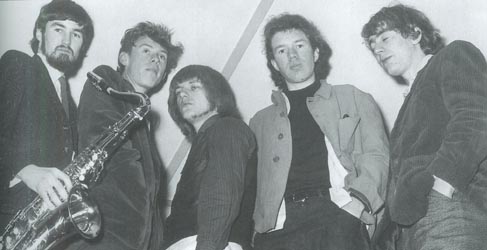
The first
session in March 1965 included "Parchman Farm’ and
Kevin Ayers’ "She’s Gone".
"She’s Gone" is good. That’s sort of like
(sings) "She’s gone, she’s gone, ma baby’s
gone, my little woman has gone", Kevin Ayers yeah? You can
imagine almost that he’s singing it in that low voice.
That’s basically all it was. It’s a quite interesting
form of chords because it just goes "duh-du-duh, duh-du-duh
etc etc" so there’s a load of chords and then it goes
into the bridge which moves up a certain interval…
You still
remember it?
I remember all the tunes I’ve ever played, from Camel,
Caravan...it takes me a few moments. Hatfield and the North is
the most difficult because it’s the most complex form of
chordal structure and rhythms.
What about
this first time in the studio? Nervous?
It was all geared for you. You just literally went in there, I
think it all went down one mic and you plugged in and a man came
out with a microphone, stuck it up and away you went. I think the
first one was probably done on mono, onto 2 track, and as I say
we just used to make a din. Listen to the CD. It was just a
rather wobbly tuned din.
Was it the
case that nobody really knew what was going to come out?
No, we’d done rehearsals and gigged a couple of times,
usually parties. It wasn’t concert music, it was
particularly for entertaining people to dance about to, and
I’ve only ever half been into that really. But I was a bit
limited in my imagination then and of course these were the
‘Big Boys’ who had listened to a lot of people-jazzers
and God knows what else and they dealt the deal. But they
particularly wanted to play Chuck Berry-esque or their own tunes,
or Mose Allison.
Were they
happy with the results?
I’m sure they were. Trying to get more concerts, the idea is
that you made this small record, a 45 and you played it to people
so that they could hear you so that you could get concerts.
Didn’t the Wild Flowers used to play the local cinema, in between films?
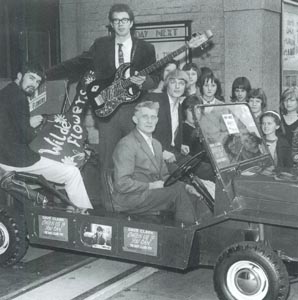
I’d left by then I think. That was more Pye and Robert later. I think they tried to do most of the theatre stuff. There’s a photo of them leaving the cinema in a Mini-Moke with Dave Clark 5 stuff plastered all over it. When you live in a small town and you’re a small band you go round and advertise stuff. I remember Hugh making this special Wilde Flowers stamp and stamping it on everything, just going round trying to be known. I think Kevin Ayers thought up this name, "Wilde Flowers" with an ‘e’which meant that we were more ‘Hippy/Poppy’, trying to do our own thing. It was the fashion of the time I think.
Kevin was
the first one to leave wasn’t he?
Yes he did. It wasn’t quite working out. I think they
decided that it wasn’t working out, I don’t know, I
wasn’t in the decision making thing then. I was just the
youngest member of the band, playing guitar and trying to be in
tune. Playing some very simplistic thing where you just play two
notes, sort of ‘dink-dink, dink-dink’ because it was
the way to do it rather than the ‘mudging in’. I mean,
the ‘mudging in’ came in later with Caravan, but in the
Wilde Flowers, they would have the ideas and I’d try to make
them sound like they wanted it I suppose, with not too much
‘out’ of my own then, being only 16. I wasn’t very
studied in the music forms and I’m still not in fact, but I
enjoy them.
You did
another demo and this time you got to sing on it.
I sang in the studio on the demo of "A Certain Kind".
Pretty straight. Later it was used on the first Soft Machine
album, where Robert made a really nice version of it with far
more imaginative use of voice and using his character. He’s
a very good entertainer. Yeah, for the period of time that I was
in The Wilde Flowers obviously that did influence me quite a lot
but then everybody I ever play with influences me if I really
want to get in there and listen to it. But then I was just a
young boy of 16 and I think I was more interested in messing
about on my guitar at home on my own.
So at that
stage you weren’t thinking of music as a career?
I’ve never thought of anything as a career to be honest with
you, so I wasn’t that sort of minded, I just drifted along.
I even do now really, but The Wilde Flowers, I suppose it’s
fun for some people because it’s historic but personally I
don’t really like it much to be honest with you.
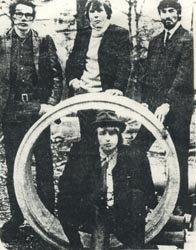 But Wilde Flowers have come to be
considered the root of All Canterbury Bands…
But Wilde Flowers have come to be
considered the root of All Canterbury Bands…
That’s down to journalism. The Wilde Flowers weren’t in
a vacuum, there were lots of other bands around in Canterbury but
they never actually got into the same wave-form as we did. When
Caravan started in ’68, you’ve got the Soft Machine and
us and suddenly we were put on the shelves around the world
because we were labelled as this interesting,
‘Underground’, popular new sort of listening thing.
Soft Machine more than us because they did big tours with Jimi
Hendrix round America, so that was quite a big market they opened
up. There were 2 bands opening up quite a large international
market and then that’s what journalism starts to write
about, they tell the news-this has happened-and then suddenly
everyone relates back to all these interlinks between two bands
that had become pretty well known, and The Wilde Flowers became
part of that. The whole scene became bigger than any one
particular part. It covers a lot of ground. Entertainment wise
you have the pop element of it and there’s also the
musicianly, jazz thing of it, but they inter-mix which is what is
so interesting
You quit
the Wilde Flowers to go back to college…
Yes, I got fed up with it. I just got bored with it. I
didn’t have any ‘out’ with it. I didn’t have
that ability to be able to find a new area to be in where I could
cope with odd tunings and bits and pieces, and when you stop
taking part it’s better that you leave rather than being in
the way, especially if you feel like you’re not covering any
ground or if you don’t really equate to the singers, which I
didn’t then. I do more now. It would be quite nice to do
some things with Kevin. I quite like the way he’s done it. I
think he’s very talented. I expect he has a few things that
he likes to say that amuse people and he says it in a rather
sexy, emotional way for a lot of his popular audience.
Anyway, after I met Pye Hastings we got playing music a little
bit, because there was this club called The Bee Hive and a man
called Franco ran a Coffee House where small bands played and
made a din in there. You went down there and you met your next
girlfriend basically, and had a good laugh. It was really good
fun for us young folks then. Caravan actually played there, Wilde
Flowers did a couple of concerts. Pye and I used to play down
there because a man called Peter Gilfillen was trying to build a
studio there. Franco had allowed him to have the garage, and he
got some money and was building this studio. We took part a bit
and did a little bit of the woodwork but eventually I decided I
was bored. I was more interested in playing things at college,
because I was at the Art College then, doing Industrial Design,
and I decided to leave The Wilde Flowers. I didn’t want to
do their thing, I didn’t like the music much and so Pye
joined them instead.
Did you
still follow their progress after you left?
Not really. I didn’t bother because if you’re not
actually doing the same thing you tend to do your own thing. I
didn’t know what the Wilde Flowers were doing. I went to
college and I was doing Silversmithing and the main things for me
were visual and learning about the mechanics of products, the
ergonomics of this tea-pot, that kind of thing. I was studying,
but at the same time there were a load of people that were
thinking of doing music, and lots of music was actually happening
if you could catch hold of it. I remember when I was at Art
College actually doing a concert and I started to play with lots
of other folks. Actually, Robert Wyatt was a model at the Art
College where I was so I used to see him in his underpants and
have to draw him! All the Wilde Flowers members were tied up with
the Art College anyway in as much as they had girlfriends from
the college and everyone would end up playing music in their
homes. It was mad, though it was really good fun obviously.
The Wilde
Flowers ended up going in a more commercial, Motown influenced
direction.
Yeah exactly because both Robert and Pye liked to sing Soul.
Robert wanted to be a popular singer, a Rock singer and an
entertainer because he liked dealing with lots of people and
entertaining them with his bright ideas. He thought that was a
good possibility. He actually likes a lot of pop music because
that’s what he calls himself. He’s in the popular
market.
So he
wanted to be a "Star"?
I’m not sure, you’d have to ask him. I’m sure
everyone thinks that way really, especially if you’re
scoring the most women and have long blonde hair and you’re
having fun like Robert was. I’m sure he did want to be a
star, you know, but that’s what "Stars" do
isn’t it? Score the fast car? Well Robert probably
wouldn’t have needed the car but he would have needed the
women to make sure that his emotional thing was ‘up’
and he could deliver the goods.
Robert
soon quit The Wilde Flowers too though…
Oh he had other things to do. He went with this guy from up North
and they had decided on a pop career together. A guy called
Norman from Liverpool. That was quite a shock too although it was
after I’d left.
The Wilde Flowers went through quite a lot of personnel changes didn’t they?
Yeah, it was like a bunch of mates really that played music together. They tried to stick a band together but it wasn’t totally professional because they all had day jobs.
They won a
Radio London Rock Group Contest
Yeah, they did pretty well I think. They got more popular after
I’d left. It’s the same with Caravan…
To move
on, something must have got you interested in performing in a
group again?
Pye and David Sinclair and Richard Coughlan! I was at college,
they were in London. The Wilde Flowers had finished and they were
trying to do their own thing. They were quite interested in
forming a band. I was just available at the time and knew them as
mates apart from Richard Coughlan, who I then got to know through
Pye, and we formed a band that eventually got called Caravan. I
decided yes, this is a good idea and yes I would like to do this
and go on playing. So basically we just pissed about around
Canterbury during a period of time when I was either going to go
back to college or not! I decided that it would be nice to
actually make this thing work. We needed some cash so we all went
to work on a motorway except Richard who had his own job as a
Dental technician in Canterbury. They’d been playing music
together since The Wilde Flowers split, trying to spend as much
time together to form a new band. They needed a bass player and
singer. Nobody knew I was actually a guitarist and so we all
clubbed together. Dave played a bit of bass and Pye and I played
a two guitars thing, but then Dave wanted to play keyboards, so
someone had to play bass. I quite liked playing bass and singing.
It was no problem at all, so I picked up on the bass and
eventually had to get one! My first bass was borrowed from Dave
Sinclair, a Vox Cougar, and then my second bass was given to me
to play by Hugh Hopper (who was then going off to Roadie with
Soft Machine in America), a very nice Precision, which was a
beauty and had lots of cuttings of wild flowers and all of this
other stuff glued all over it. Dave put his energy into getting a
nice big organ. He had a Vox Continental at the time but his dad
bought him a Hammond in the end. Soft Machine left us all their
Marshall equipment that they’d been using round England
because they couldn’t take it to America, and so we became
Caravan. We did 8 or 9 concerts around Kent after working on the
motorway and got enough money to rent a place for three or four
months, Westgate terrace in Whitstable, opposite the reservoir.
We moved in and I did a bit of building work and made it
soundproof. Dave had the biggest room because that’s where
we used to rehearse, so he slept amongst all the smelly
equipment, Good Old Dave, what a Beaut! His dad had bought him
the Hammond Organ by then. It was an A100, which was rather
interesting. It was carefully split in half so that we could
manage to carry it because it was such a monster thing, and he
still plays it today. Dave Sinclair is a very good keyboard
player. He’s very influential, he’s melodic, he’s
got that Sinclair trait, he uses melody.
Dave
probably made Caravan stand out at the time because it was the
age of guitar heroes apart from Keith Emerson with The Nice.
Yeah, but Dave’s always wanted to play solos like a guitar
hero. Dave’s thing that makes him interested is that
you’re eventful with your harmonics. He’s very into the
Canterbury type harmonical area. His sound is particularly
interesting. I think Mike Ratledge, Dave Stewart, all those
people… Brian Auger, Pink Floyd’s keyboarder, all those
things come from a time when new gadgets were becoming available,
the fuzz-box, the wah-wah, the Hammond Organ, the Lowrey, they
were used by lots of people who got in there and got it onto
record, and then it became popular. Dave Sinclair uses the left
hand side and he plays the tone keys, so one of his trademark
sounds was that he could actually make it go round real trippy
and keep changing the sound for every note but playing the notes
at the same time as he’s changing the sound on there. Mike
Ratledge played Lowrey but he used to have a pedal that would
drop it a semi-tone, which is a sound very particular to Mike.
According
to Hugh Hopper, Mike Ratledge was the straightest player that you
could get and the rest of Soft Machine spent a lot of their time
and energy trying to get him to ‘fuzz things up’ or do
‘daring’ things.
Yeah, you can understand that because he had a classical
upbringing. His father was my Headmaster, which was my only real
connection to Mike. Mike was an amazing long-haired
‘black’ figure. I remember him sitting in
someone’s garden, I think it was Pye’s sister’s,
out in Sturry at Whatmore Hall and there was all the Soft Machine
gear outside and this American guitarist Larry (Nolan) was there
at the time. Daevid Allen might have been there but I don’t
think he was actually. Larry had a nice big L5 Gibson. I remember
it well. Pye ended up living there too; his sister took on this
place that he could stay in basically. Kevin Ayers used to come
and visit there and Robert and everybody. I saw them play in the
garden and it was amazing, really good music with the Hammond
organ and the drumming, it was like Yay! This is good news. This
is somewhere else! What a din it was but what a nice lot of
harmonic stuff was being used. They had Hymns being used for Rock
& Roll. It was like Yay here we go! I remember being really
fascinated by that and thinking yes, this is where pop music can
go. It was an alternative to the dinky-dinky, dinsy-dinsy poppy
music of the time. Suddenly there was this interesting way to go
and of course Soft Machine really took off. I remember hearing
their first album and thinking it was great, and realising that
Hey, we’re like those guys ‘cause Dave can play just as
well as that, and he did. There was Pye’s influence and
Richard’s influence too. They’d already done that Soul
thing and they were much more into doing the Rhythm and Bluesy
type of thing rather than the real Jazzy Rock and they always
were, whereas I think I’ve always chosen the jazz route. In
fact I’m surprised at Pye because he was the one who
introduced us to all the things like Don Ellis, three and
two-thirds time, counting out odd rhythms with eleven beats in a
passage and 7/4, which is great for writing songs. It opens up
such a big area. Personally I kept leaning towards the more
atonal.
This was
when you started writing your own songs?
I always pinged about and wrote little bits of tunes, even when I
was in The Wilde Flowers but they never really chose to be
finished. They were just like little harmonic things that I would
think were interesting, but I was more interested in learning
other people’s more elaborate tunes. However, once you start
you just get going and the more you learn on your instrument the
more often something new and interesting appears. It’s in
there anyway, you just write it and out it comes
Who were
your influences on the Bass?
My father played double-bass! That’s it. It’s as simple
as that.
So when
you switched from guitar to bass you didn’t try to
particularly emulate anyone?
I just picked out some music of the time, on bass, heard it and
learned it. That’s how you learn from other people, they
play you something or they write it on a bit of paper and you
play the notes and you see how they work with the chords and the
melody that are there. I first started to play bass with Caravan
but I’m always playing bass on the guitar anyway. When I do
solo performances you’ve got bass notes and so it’s
nice having other musicians to play your chords and stuff, but
then again it took me ages to get up for it because what you have
to do is let them play it the way they need to so that they can
get their spirit out. If you trap them and say "No, these
chords only go this way", from a musician’s point of
view the same chord over and over again you start to get
irritated by it, especially if it’s got the root and the
fifth and the third and everything in there without all of the
dissonances that make melodies work. So you get annoyed,
they’re already there, so what can you play? So you play all
this alien stuff all round it and everyone thinks you’re
playing it wrong just ‘cause you’re bored with the
notes.
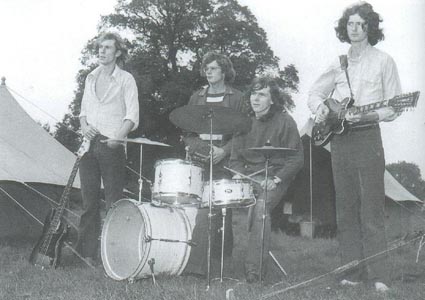
OK, with
you now installed as bassist, Caravan began rehearsing…
In Whitstable for six months. We wrote our first pieces of music
down there. It was mainly Pye’s energy to write new pieces
of music with us all playing. We all had different ideas and bits
of our own that we played but Pye managed to formulate his music
most, write the lyrics, get the melody sorted, get a pattern of
music to play, get people to play what he fancied doing. We
achieved that to quite a degree, but as a collective force we
used to play things freely and things could go as far as they
went, as far as we wanted them to go then. We used to play for
hour after hour after hour after hour and work things out and
have fun. Just have fun together. Then we did a few concerts, and
we went to stay with Pye’s sister for a few days when she
had a flat in Sloane Square. We stayed for six months at Westgate
Terrace and then we had to move. We were trying to get places to
rehearse, and we ended up in Graveney Village Hall. Verve had
decided that they wanted to sign us and they wanted a record
made. We eventually got set up with a guy called Ian Raffini as
our Manager and it worked out pretty well. We didn’t have a
lot of money, we didn’t have a lot of food, but we had
Graveney Village Hall to rehearse in for quite a few days. We
used the kitchen there to make food and eat and managed to supply
ourselves. The Record Company used to give us a small amount of
money-seven pounds a week between the lot of us-and we had tents
outside the village hall in August to October. It got so cold
that we moved the tents into the village hall and then had to
take them down every so often. We were actually living in the
village hall then, and we had to move our equipment back a bit on
Wednesday nights so that the Vicar had a bit of religious space
for his young ones, the Youth Club. I remember Pye having to talk
to these kids about his idea of religion. I suppose it was quite
funny, us giggling in the front row, but then of course the next
day the tents went back in and the vicar didn’t know what we
were up to. It was warm and cosy and we were getting on with the
music. That lasted for a little while but we had to eventually
find another place.
In
’68 you went to London and played the underground clubs like
Middle Earth…
Yeah we did. We used to go to the psychedelic clubs because they
had music that was all different types of things. I remember
doing a concert with Chris McGregor’s band and Richard
Thompson was there too. I remember seeing Fairport. A very nice
show they did, actually. We did some early shows in London and
got to know Sarah who was the Secretary of the International
Times, the underground magazine. We got offered all of these
contracts from Witchseason (Joe Boyd’s Company that was
affiliated to the Island label) and one or two other people and
we eventually took the one with Verve.
Had you
made demos?
Yeah but I think they actually came along and heard us play. I
can’t remember where. It was all decided--yes this is an
interesting band and they should make a record. We went into the
big Moody Blues studio, Advision I think, to do the first album
with Tony Cox as producer. We had a nice time and we made a
record, mainly under his guidance.
Can you
remember why you went with Verve? They were just starting their
operations in Europe.
It just seemed like the brightest thing to do. I think we just
spoke to a few people. I mean, we hadn’t got a clue and
that’s why all the money was signed away. And we’re
still the same! We’re still all as bad as each other with
contracts and things. Basically we haven’t got a clue about
the business and that’s why it all just falls down flat on
its face and we all moan at each other because we’ve got no
money. None of us has got a clue how to work the business yet the
fans always think we must have. The Soft Machine had a contract
and I think we imagined that we were following the steps that
Soft Machine had taken, trying to get into the business. I’m
sure that Pye being the more business minded of us all is into
that, but me, I just wanted to play the music and get on with it,
get it over and done with and play it as well as we could so we
would get much adulation and then hopefully we would make some
money. But of course business with music doesn’t work like
that, you’ve got to be far more tough, deal with it totally
for yourself and of course you’ve got to survive
haven’t you? The same sort of situation exists for me now. I
can play music, I entertain people, I’m rather poor at
business but I’d like to make some money from it. This year
will be an interesting one now because I’m going into home
CD production. Back then, you could go into home production on
what? You’d have to have done it on cassette recorder I
suppose. In fact I’ve got music on tape from that period of
time, not complete, it’s like lots of my musical ideas and
how they are working out. I found some stuff with Robert Wyatt
the other day on the back of one of the reel to reel tapes.
This is
all unreleased?
Well I can’t release it because its just home tapes. I mean
yeah, I could release it, that’s what everybody keeps
telling me. I’ve got a whole case full of tapes, but you
have to be careful though, because other people played and
they’d like to know that it’s going out, especially if
it’s going to make them money. I’ve not done it yet but
I think I might do. It would be nice to have some money available
to make some new music, especially if the music’s worth
putting out, but I don’t think I’d want to put out just
anything. I know that there are a lot of people doing it…
Voiceprint
for one. They have released a large selection of previously
unheard Canterbury material, including The Wilde Flowers
retrospective.
Actually it might be better if I did go through Voiceprint, if I
provided the goods and said here’s the tape, use this, and
then sorted out a deal. I think that’s what’s happening
at the moment with many things. You’ve got Dave Stewart on
Voiceprint, Phil Miller’s on Voiceprint, Pip Pyle’s on
Voiceprint. Maybe it would be worth me going into it, but the
deal has to be right
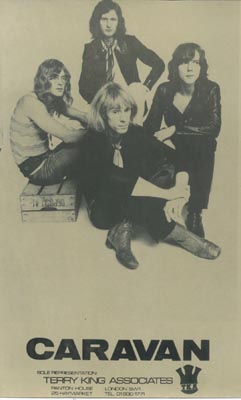
OK, going
back to the first Caravan album. What do you think of it all now?
I like to hear it. Yes, great fun. Good.
Were you
pleased with it at the time?
You mean as a musical thing? For sure. Very pleased with it at
the time but then what else could we be? It’s like
you’re working, you haven’t got much time, you
don’t consider it, you play those songs, you just try to
make as good a job with it as possible. Later it moves on and you
start to think that those songs could maybe be done better now
and done in a new fresh way but by then you’re onto
something new anyway.
What about
the production?
The production was all done by Tony Cox. I think it’s stuck
in people’s minds a certain way.
Your two
songs on there are very, very bass heavy.
Probably yeah. I don’t know why they mixed them like that. I
didn’t have a say in which way they were mixed. I think we
suggested things but it was mixed without us being about. I
don’t know, are they bass heavy? A bit mushy?
The vocals
seem to have been mixed a bit too far back.
Probably yeah, but what we said wasn’t heard, then something
else happens and they think that’s the way to mix it. It was
our first time and they knew best. That’s why when I go in
to record now I like to get in control of everything, but back
then in Caravan at the time, everything was done for us. The
engineers…you don’t engineer your own music thing, you
hear it and you make suggestions as to how you want it and if the
band stand together strong enough you can get it that way. It
might have been that I was getting a bit bored, that I
couldn’t hear the bass because there was so much going on
and that went through and someone put the bass up a bit, but did
I like it at the time? Yeah. Do I like to listen to it now? Yeah
I can hear it all. I can hear everything that’s going on so
it was quite well recorded. Was it the right mix and did it work?
Who knows?
It got
good reviews.
Yeah, because it’s a great album. Nice tunes, especially
Pye’s tunes. I like ‘Place Of My Own’, not so keen
on ‘Ride’…what are the other ones?
‘Ride’
and ‘Magic Man’ are probably the most psychedelic tunes
on there.
‘Magic Man’ I like because it’s a really good,
simple tune that you can sing with kids. I’ve done that with
children. That’s a great tune. It’s easy to learn and
they like singing it. Dave’s chords are the best things
about it; what he did to that tune made the tune. I wrote
‘Policeman’ with Dave’s organ in mind, that
"joonnk, jonng, gog-a-gog-a-gog-a, joonk, jonng" part.
Dave’s very influential in those songs. I mean he IS a great
influence anyway in the music.
That album
is a very organ dominated record.
Yeah, and the singing. The singing, the words and the organ. If
you were musically minded you’d think the organ yeah.
The drum
sound is very powerful too.
Yeah. Actually Richard’s got a real good, clinical deal
that’s sort of slightly military but interesting. I actually
spot it because I miss it a bit and so does Dave. Richard’s
great to play with but he’s much more suited to play with
Pye. He’s stable and straight ahead and powerful from a good
working point of view. He’s very musicianly about that,
Richard. He’s not particularly experimental enough for
me…or maybe mental enough for me. He plays good. He’s a
good drummer. He’s got quite a nice sense of timing. He
swings, he drives, and it really stands out that it’s
Richard Coughlan drumming. He really likes clacking them. Pye
wanted that too and Richard was able to deliver that.
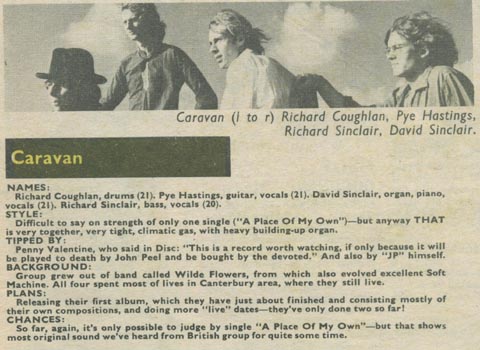
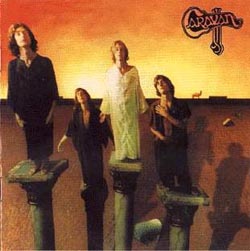 The first album was released in
late ’68 and you were gigging regularly to promote it, but
things nearly came to a tragic end early in ’69…
The first album was released in
late ’68 and you were gigging regularly to promote it, but
things nearly came to a tragic end early in ’69…
Yeah, we did a concert at the Marquee club. Gun were the band on
before us and they played well. We’d just picked up our new
PA, a Rosetti thing. The trouble was that one of the earth wires
had gone to live so when Pye came up to grab hold of the
microphone and say "Hallo!" all that came out to about
500 very damp and sweaty people was "Haaaaaa!" He
didn’t get the "lo" out, he fell backwards into
the drum kit in a shower of sparks, like the biggest light bulb
you’ve ever seen. Richard immediately tried to get through
his kit but got burned trying to pull Pye’s arm away because
Pye was being sucked onto his guitar. I was just too far away to
do anything. I tried to sort of move towards him but there was
this deathly silence for about three seconds. The audience, when
they saw what was happening, just went totally silent, apart from
Pye going "Aaaaahhhhh" very loudly out through a big
PA. What saved Pye’s life was cousin Dave, who was thinking
quickly at the time, jumped over his organ and pulled his plug
out, pulled the line out to his amp and stopped the electricity
going through him. By then I think the electricity had gone
through Pye for at least ten seconds, maybe longer. He said he
felt alright straight afterwards and his heart went back to a
normal beat, because a shock speeds up your heart, but Terry
King, who was our new manager at the time said no Pye, you must
get checked, you won’t be able to play music, you can’t
go on. Terry had seen it before and in about ten minutes time Pye
started to feel nauseous and went a funny colour yellow. They
whipped him up to hospital, checked him over and thankfully he
was OK.
And you
made as much publicity out of it as possible…
I think Terry was always on the case for everything, he was a
good manager actually. He did quite a good job for us really,
apart from now we all moan about him taking too much money, but
that’s what the contract was and we signed and that’s
the way it goes.
Caravan
also got onto TV a couple of times.
We did. "Colour Me Pop" the programme was called. The
tapes have now disappeared, we tried to trace those but
they’ve gone.
Can you
remember what you played?
Yeah, we did all the ones from the first album, ‘Place Of My
Own’, ‘Ride’, ‘Magic Man’, one or two
others. They interwove it on the TV with pictures of castles and
things, a bit of psychedelia came through on it. There are
pictures of us in our King’s Road gear, the crushed velvet
trousers and scarves and sheepskin jackets and embroidered
waistcoats and whatever else.
You also
did your song "Golf Girl" on Beat Club in Germany
That was through Terry King. He managed a lot of bands that were
happening, that he knew people liked, so he got a concert circuit
going in Germany. We didn’t do too much work in Germany but
we managed to play that. It was in Bremen wasn’t it?
I’m sure that one still survives. I’ve seen several
copies that people have done including several good ones.
It’s done the rounds.
How did
the first album fare, sales-wise?
Not sure. I was more interested in playing the music and
surviving so I don’t remember how well it sold, though we
found out later that they had sold more than we were told at the
time. The problem was that Verve closed down their European
office so we were left without a contract. Our managers managed
to get us in with Hugh Mendl who was the boss with Decca. He
signed us and we got to make the next album through Decca at
Tangerine Studios with a man called Robin Sylvester. I met Robin
recently when I was doing my solo shows in the 90s. He’s a
bass player too. He did the Clangers. Remember the Clangers? He
was the Swanee whistle player, and he was the engineer on our
second album. A guy called David Hitchcock wanted to produce the
album but he wasn’t allowed to because he was too junior at
the time. On the album it says the group and Terry King produced
it but really it was Robin’s influence in there. He was the
engineer, he did all of the recording. He was a musician and he
had ears, so the album had a much more musicianly quality to it.
There was
quite a long gap between the first two albums, something like two
years.
We weren’t actually living together so much then. We started
to disintegrate as being a bunch of boys. We started to have
families and things. Girlfriends and then wives and children
appeared, for Pye and I anyway.
Were there
any feelings of frustration at the delay?
No, we were getting on with the music, trying to keep stimulated
enough to actually play music, but we were going through changes,
David especially because the musicians in the band weren’t
dealing with his music in the way that he wanted so he eventually
left.

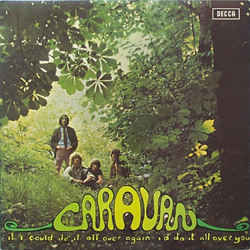 The second album,
"If I Could Do It All Over Again, I’d Do It All Over
You", is possibly the favourite of a lot of Caravan fans.
The band seem to have developed a hell of a lot between those
first two albums?
The second album,
"If I Could Do It All Over Again, I’d Do It All Over
You", is possibly the favourite of a lot of Caravan fans.
The band seem to have developed a hell of a lot between those
first two albums?
Yes, that’s maybe so. We grew up a bit and got into a lot
more things. Everybody was developing, finding new formulas and
things, they always do. My music tends to get influenced by the
ones who are developing sounds and ideas and how to play them
rather than sticking with the media system of the time.
Were the
songs on the 2nd LP mainly Pye’s again?
Yes. Pye was much better at completing his music than any of us
really.
The most
famous song on the album must be "For Richard".
(sings riff) We were just playing riffs and as you play you find
things to do. I found that riff and Dave got hold of it. He
started pulling it around because he liked to write around riffs
like that. He wrote a whole piece of music just around those two
notes and made the whole thing work, and so he called it
"For Richard" which was for me. Pye wrote a little bit
that was slotted in before my riff, and then there’s one of
Richard’s rhythm things, so we all clubbed together to make
this bit of music. The main melodic influence came from Dave
Sinclair with Pye sort of putting it into a story in the lyrics.
How about
the hedge-clippers on "Hello, Hello"?
I think I added that. Pye and I were very influenced by each
other’s chords and writing so there was an inter-mix of
ideas. I think the hedge-clipping melody came from the idea of
the words and it started to come from Dave first of all. I like
to play odd figures and this ‘diddle-iddle-id-dum-dum’
kind of thing is very Pye-esque but I’m always writing
things in fives and the strongest sort of melodic thing on fives
will come through-but that was probably Pye’s, though maybe
it was Dave, I’m not sure. Pye used to come up with most of
the ideas that got heard because he was actually interested to
sit down and complete them each time. We just used to have fun
with them mainly, farting about and in the end, sort of getting
it on and trying to write songs. I think Pye was much better at
that than the rest of us. He’s more prolific. He came out
with more ideas that he had to have played, and they were simpler
ideas so they were quicker to learn. Once he’d found them he
was happy with that, he didn’t try to take them any further
and because of that they were more commercial
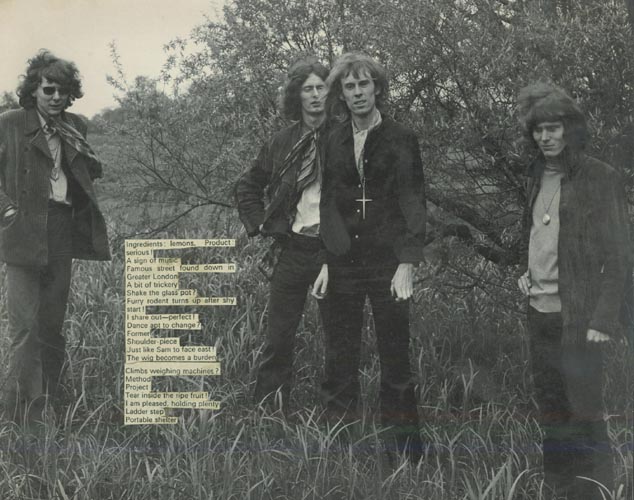
A good
example is the title track. That one got you onto Top of the
Pops…
(sings) "Who do you think you are?" That’s a 7/4
figure that Pye was interested in. He came up with the words for
that one for sure. I found bass parts around it and things just
developed but the pattern of chords came from Pye. It got pushed
about a bit but Pye completed it by really tying it down into a
form whereas I was probably suggesting another way…why
don’t we put that in there and why don’t we chain this
bit onto that. By then it was a formula. It was an understandable
bit of music, it’s what would be regulated and be acceptable
and be Pye!
I suppose
the TOTP clip must be long gone?
Did we do it on TOTP? I was probably trying to cut through cables
with shears knowing me.
The cover
of that second LP. It’s not actually the group stuck in the
middle of the Kentish countryside is it?
That’s in London, Holland Park. You just walk in,
there’s nice Chestnut trees in there and one of the
photographers who was local to there said come on, we’ll go
in and do some nice photographs and it’ll be nice to have
you sitting down in the woods and looking cool and groovy and
that’s what we did. It was fashionable for bands to pose in
trees in those days, especially in London, with all the traffic.
That was the joke wasn’t it? I was always going out to get
my head together and sit under a tree. I still do that now, go
and have a chat to a tree, you know. It seems to make more sense.
So the
album comes out, great reviews again, sales probably better than
the first one and you’re out touring, playing the Festivals
in Europe such as Rotterdam.
The first real big major concert that we ever got on was the
thing that they called Pink Pop in Holland. It was like a big 3
day Festival of bands that were popular at the time and a few
that were being talked about, like Caravan, and we went out there
and we played on the second day. Soft Machine were on the same
day as we played. We were first on and the main attraction of the
day was Mungo Jerry! I remember two hundred thousand paper plates
all going in the air at the same time to "In The
Summertime", that was great. We were supposed to go on about
one o’clock, the first band on in the afternoon. It had been
drizzling with rain all night and a good half of the audience had
probably stayed overnight in things called ‘special
Festi-bags’ or whatever they were called then, they were
like bits of paper and plastic stuff, and they were just steaming
and still more or less asleep when we went on. They were just
sort of comatised there in this drizzling grey, and we
couldn’t go on for another hour because some idiot came on
with a big brush and pushed the water out of the canvas that was
hanging over our heads and they swamped the stage. Everything was
sparking and God knows what. I remember when we did go on, we
were standing about forty foot up in the air on this huge stage
with massive banks of speakers. For us it was the biggest thing
we had ever done and the biggest audience that we’d ever
played to at the time, those who were awake anyway. I think a lot
of people enjoyed it, as they did the whole Festival.
Do you
recall jamming with Frank Zappa?
That was later, at the Actuel Festival in Amougies in Belgium, in
a big marquee that held about five thousand people. It was a
double, round ended tent with a big gantry through the middle.
The Festival was compered by Pierre Le Tez, who was a radio
presenter. On the bill were artists like The Nice and Archie
Shepp. It was like a whole job lot. I’ve still got the
programme. That’s where I first saw Gong. On the day that we
played they had The Nice, East Of Eden with Dave Arbus, the
violinist who still lives in Canterbury, The Band, and Zappa was
there to play with everybody. Just before the concert got going
he spoke to every group that he’d seen doing a quick
rehearsal. He just said ‘Hello I’d like to play with
you for about ten minutes, have you got a tune that could work
with us?’ I think Pye suggested that we play ‘If I
Could Do It All Over Again’. We made it last ten minutes and
he played a solo on it. He was quite a small man actually and he
looked very stoned indeed, but actually he made a good job with
everybody he played with. I remember him climbing onstage with us
and it was like someone putting in the handle to start up a
vintage car engine. He just wound it up and it was amazing, just
incredible. We were just playing a 7/4 figure over a small amount
of chords and Dave was rocking it up. It was really good. The
band that played before The Nice, Germ they were called, were
like a 15 piece, maybe more, and they did an
‘experimental’ bit of entertainment. Amongst all of
this Rock & Roll and Jazz they played one note for thirty
minutes and it disturbed the audience so much! They were just
going ‘Urrrrrrrrrrrrrrrrrrrrrrr’, all one tone, all of
the lot of them. In total contrast to lots of notes and rhythms
it was just one note with varying rhythms, droning on and on and
the audience just pelted them and made them leave the stage. They
pelted them with everything they’d got, cans and everything.
The Road Manager of The Nice, Baz Ward, came shooting on stage
and turned all the Marshall cabinets the other way so that all
the speakers didn’t get broken because all the tins were
hitting everything in sight. Then he had to dash off stage and
hope the gear would survive. They had to wait until the audience
had calmed down and then The Nice came on and everything was OK,
but that was one of the highlights. It was like "What IS
that?" Bang, Bong etc because they didn’t like one note
being played for thirty minutes.
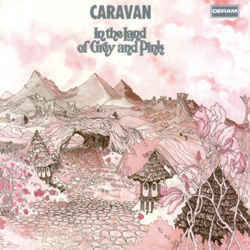 Let’s move
onto The Land Of Grey And Pink, which is now generally considered
to be Caravan’s classic work. It differs from the first two
albums in that most of the material on the record was written by
Dave and yourself rather than Pye.
Let’s move
onto The Land Of Grey And Pink, which is now generally considered
to be Caravan’s classic work. It differs from the first two
albums in that most of the material on the record was written by
Dave and yourself rather than Pye.
Three of the tunes were basically mine and some of the other bits
and pieces yes, but we were getting a bit stronger and we decided
that we did want to get more of our ideas out. I’d written
little bits of tunes that I’d never completed. If you listen
to some of the stuff that didn’t make the original album but
has come out on the CD as bonuses, you can see that I was writing
more melodic songs that were going away from the ‘Rock’
thing, but I was having to compromise and get them done in the
band’s style because the band wanted to musically ‘rock
out’.
Those
three songs, the title track, Golf Girl and Winter Wine are still
probably your most ‘celebrated’ songs.
They are, aren’t they, but I suppose that’s because
more people have actually heard them. That album sold well enough
between 1971 and 1980 to go gold. Caravan just awarded themselves
a gold CD for Decca sales of the album in England alone. One
hundred thousand copies sold of product. It’s never been out
of production basically. There was a survey that said that
it’s one of the albums that has never been deleted, so
that’s done us a world of good and you can’t buy that.
I suppose those songs are more identified to me because I sang
them. They all put their chip in, the songs sound like they do
because of the band and when you write tunes that’s the way
it goes all of the time. We’ve all shared the royalties and
that’s good. We all put our part in and that’s why they
sell like they do.
Where did
The Land Of Grey and Pink come from?
Lyrics or melody? The lyrics came later. The melodies always come
first for me and that one came from being out in the countryside
down at Graveney in the years before and having this pink and
grey sky every evening because we were camping out there. As for
the lyrics, it’s just a load of words that half mean
something. It was drawn on the album sleeve and that gives it a
real good character. I was always messing about drawing little
fantasy areas and things where you’d like to be, and Pye
writes about them…place of my own… somewhere to
go…magic man floating off on his cloud and all of that sort
of thing. "In the land of grey and pink where only Boy
Scouts stop to think". Boy Scouts tend to stop and think a
bit, they’re trained to aren’t they? It’s a joke
on words really. I was a Boy Scout, bob-a-job. "They’ll
be coming back again those nasty grumbly grimblies",
they’re those funny thoughts that seem to take over. You do
it to yourself really, just make them into little men who climb
about. "They’ve come to take your money", like
everything you’re trying to earn a bit of money and all of
these other thoughts come along and take it away and you have to
start again.
So the
land of grey and pink isn’t a particularly pleasant place to
be?
I think that’s my mind isn’t it? Sometimes it’s
not a very pleasant place to be and you have to sort of let a
little bit of it out and it amuses other people. And don’t
forget about your dad, out there in the rain. Have a chat to him
because later in life you’ll miss him. "Cigarettes burn
bright tonight"…all good ideas burn bright tonight but
they usually go the same way and disappear. Sometimes, not
always, but that’s the way it is. It’s about your
problems, sometimes they go down the drain, forget all that shit
and get on with the happy life. See, it’s just a joke, not
with too much sense, probably because they went to get some punk
weed y’know.
What about
Golf Girl?
Standing on a golf course, right opposite where we were staying.
When Caravan moved out of our tents we moved to Stodmarsh, apart
from Richard who had his own place somewhere else. Dave, Pye and
myself rented a place called St Elmo on the money from the
company-it was a very small amount of money a month-and a golf
course was right opposite it, Canterbury golf course. I decided
to write a tune about a girl standing on a golf course which I
decided would be my girlfriend of the time, which was
Pat…and she sat under a tree, and we went for walks in fine
weather…and that’s what it was about. That’s it
really, a joke about people wearing PVC and selling cups of tea,
which seemed to be very appropriate at the time because we were
having cups of tea with Robert Wyatt and God knows what else.
People had ‘tea’ and they liked to write songs about
it. Every other song was written about ‘tea’ so I got
one in as well…full right to the brim.
And side
two was ‘Nine Feet Underground’
That was mostly Dave with a bit of Pye. I don’t think I
wrote too much of that. Nine Feet Underground was Dave
Sinclair’s idea that had been waiting to get made into a
piece of music that lasted a whole side of an album. Thank
goodness he eventually managed to get it done and lots of people
still enjoy it now. We all worked out parts, mainly from
Dave’s ideas where he wanted the notes to go. They had to go
in a certain way and we extended that by playing solos and stuff.
When someone is playing a solo I try to form a bass line but also
try and solo a bit with it so that you can hear what was going
on, but I also try and make the music move to where the solo is
rather than give it a percussive force behind it that is kind of
‘Regimental’. That was more Richard Coughlan’s
definite idea. He kept things very stable and made the music work
in its different pieces.
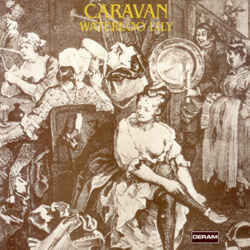 You play some great bass on The Love In Your
Eye from the next Caravan album "Waterloo Lily".
You play some great bass on The Love In Your
Eye from the next Caravan album "Waterloo Lily".
I can’t remember it. How does the tune go?
(hums
riff--badly)
Ah, it was almost like ‘Big Band’ music. I can’t
actually remember what I did on that. I probably played it with
some ideas that weren’t particularly standard maybe, which
is why it sounds different. You know, I keep finding odd bits
like that, copies of old discs and stuff and I say bung it on, I
want to hear it. Now that you mention it, that’s the reason
that I get to hear these things again. People say "Ooh, do
you remember?" because they like this or that, and I think
"oh yeah that’s interesting". Steve Miller was on
that album. He was a very strong influence. He was playing
‘band’ music rather than pop. He had been playing blues
and stuff with Carol Grimes and Delivery. Steve was a great
influence on my music, both him and his brother Phil because they
were very musicianly about their music. They could push the
boundaries out to go in different areas where the music builds
and the technicality improves and you’re able to use a bit
more…grammar if you like.
We missed
out Dave leaving and Steve joining Caravan.
Different influences, a different sound. It was a different band
all together and it’s a shame that we couldn’t stick
together a bit longer. It would have developed into something
more but still very fresh in approach to the music, which was a
bit bluesy, a bit jazzy, rather than a more pop orientated
Caravan. Steve was more of a piano player than an organist. He
wasn’t so keen on organ although he did a good job on it. He
was more into another area which, when compared to the sounds of
the time, was a bit more fragile. It was experimental but without
the massive amount of sound overkill that was going on with
Hammond and Lowrey and Leslies and Moogs. Obviously on Waterloo
Lily the jazz stylings come through and that’s when the band
had to split because Pye didn’t really want to go that way.
He wanted to entertain people in a similar way to we had done
before but with a more Rock ‘n’ Roll approach instead
of a Jazz ‘n’ Roll approach because Pye was more rock
orientated even though he listens to a lot of jazz. He was into
pop music much more than the rest of us. He identifies with it
because that’s what he tries to write.
Waterloo
Lily is a schizophrenic album don’t you think?
Yeah, I think that’s my fault. I am schizophrenic, I do like
change.
There are
Pye’s poppy little songs like "Aristocracy" and
then you have Steve’s ‘looser’ pieces and tracks
like "Nothing At All".
That’s something I developed to do. It comes from that
‘Jack Johnson’ Soundtrack by Miles Davis, and it’s
literally that rhythm. We used to play around with that and
that’s where "Nothing At All" comes from. I said
"This is good, this’ll get us going", but of
course the actual tonalities were a bit alien to Caravan. Me and
Steve were trying to push the boundary out so it’s a bit
more rhythm-y, a bit more of what musicians want to do together
rather than what singer-songwriters want to do.
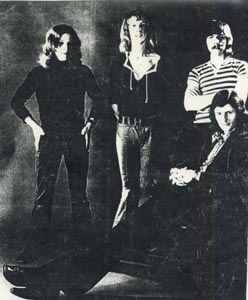 Actually that album wasn’t so much
schizophrenic as multi-phrenic because there were the poppy bits,
the jazz, the epic prog number and also the bawdy Caravan humour
in the title track. Maybe there were just too many directions for
the fans to take?
Actually that album wasn’t so much
schizophrenic as multi-phrenic because there were the poppy bits,
the jazz, the epic prog number and also the bawdy Caravan humour
in the title track. Maybe there were just too many directions for
the fans to take?
Yeah, that’s what was wrong, because we were not working
totally together and putting all our energies into sorting it out
so you tend to drift apart and that’s what happened exactly.
I mean, it would’ve been nice if Pye and Richard could have
dedicated their time to Steve and I and just played along with
it, but it wasn’t like that. It was mainly just Steve and I
playing together. Richard and Pye only really came together to
rehearse and play the music together if they were with us. They
didn’t go away and do it together on their own and so they
stopped doing the stuff that makes the music go on or off the
rails. You tend to spend a lot of time with other musicians
getting other influences and when you’ve got a band of
musicians who just play it one way it gets to be less satisfying.
We had used to do get together in a room and just play because we
had the time to do that and the desire to do it. Nowadays, with
those same musicians the desire really comes from the audience
who would like you to do it, but there’s not enough money
available to cover the actual amount of non-desire there is to do
it from the musicians. You’ve got other things going on in
your life that you find you would rather do and so that’s
what you do. It’s a shame but you’ve got to have the
time to do this stuff and you’ve really got to want to do it
and hope that when you’re working together the future result
is a positive one. If you want to re-form and simplify the
formula for the audience so that in fact you’re very
entertaining in a particular way that they can recognise then
that’s what you go for, and that’s what Pye’s
doing. How I feel about it is that for sure Steve and I played
music all the time together, non-stop, day and night, taught it,
thought it, because that’s what we wanted to do. In the end
the other two weren’t finding the time to do that because
they’d got other priorities, children or whatever, or they
thought we wouldn’t earn enough money playing that way, so
they decided not to do it that way. They decided their money
would come from playing familiar Caravan music, with that market
in mind but just making it a bit more ‘Rocky’, a bit
more guitar led.
They drew
the blueprint with "For Girls Who Grow Plump In The
Night" and they’ve pretty much stuck to it ever since.
Away they went. Yes, I’ve not really followed their music,
but yes for sure that’s what they did.
You’ve
taken part in a couple of short-term Caravan re-union projects,
but you appear to be estranged from their scene now. How do you
feel about Pye continuing with new Caravan line-ups?
They’ve got a market. Pye directs everything and Richard
backs him up very well. They’re nice writers and good
players. They’re entertainers rather than jazz musicians.
They think their thing out but it’s really more to do with
media operations and doing a certain amount of concerts to be
financially viable, rather than writing and creating new music. I
like to do that kind of stuff too, lots, but I tend to do it in a
different form because I try to play with other musicians who
aren’t just identities in the pop world, they’re also
musicianly and they’re using wider harmonic ideas. They are
prepared to take risks and not just capitalise on the thing that
you know is safe and well. I mean, I’d love to be asked to
play with Caravan but for me their current music form
doesn’t cover it. I think it’s the same thing but in
reverse from their point of view about me. When they listen to my
music it’s far too elaborate for them, all of these millions
of notes and things that are colliding and not quite landing in
the right place. But because of it, that’s what gives the
music my character.
I’m still doing what I did in the 60s and really that’s
why I’ve always left these bands. I’ve always wanted
change, but the way that I change is that I get together with
musicians and really enjoy their company and play music. If
you’re in the same room for long periods of time you should
work towards the goal of making your music more exciting and not
compromise it by aiming for a lower level than you can actually
develop to together just so that a mass audience can accept it.
I’m not interested in that. I’d rather take everybody
with us and to do that you have to go through the histories of
all music, because to develop your own style you need to know
what the other pioneers did in their time and then you
can…not do it the same way but you use their thinking,
"Oh well we don’t need to do it that way, we can turn
that upside down and we’ll play it some way else and see
what comes out and change the whole concept of the
instrument". So instead of singing "Freight Train"
by going like this (plinks on ukulele in genteel fashion), you
use a different spin-"I’m not going to use it like
that, I’m going to try it like this" (aggressive
ukulele riffs)-you can change it another way and everybody goes
"He’s gone fucking mad", but that’s how these
things stick, and if enough people do it then it takes off, hits
the media and then it gets called
‘Out-Progressive-Retro-Sonic’ or something’.
Finally,
looking to the future, what musical projects are you planning?
I’m trying to get really settled into music this year but I
keep getting interrupted by people who want new bathrooms fitted!
I’m planning more releases on my Sinclair Songs label,
cash-flow permitting. In fact, Dave Sinclair was sacked by
Caravan last year and I was on the phone to him yesterday. He was
saying "Well Rich, we should do some music together,
everybody’s asking for it, even the musicians say that yours
and my thing, we influenced this and that, it’s very nice
and we should use the musicianly part of Caravan and make our own
albums". I said "Good idea Dave, let’s
start".
For information on Richard
Sinclair&#;s current musical activities see http://myweb.tiscali.co.uk/sinclairsongs/
An official web-site for Caravan can be found at http://www.caravan-info.co.uk/
The best site for comprehensive Canterbury Scene information is http://perso.club-internet.fr/calyx/
Groups, musicians, releases, opinions...it's all here.
Special Thanks to Richard and Heather Sinclair